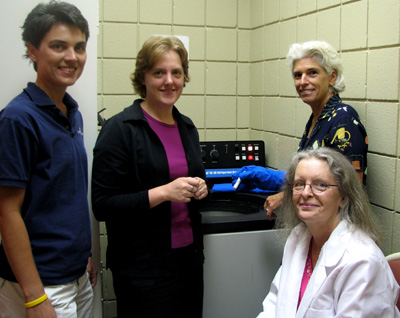
FAYETTEVILLE, Ark. — In October, 30 members of the faculty and staff of the College of Education and Health Professions will spend a few minutes each day for a week chewing on a small stick of cotton in the name of research.
The activity is the latest phase in a study that looks at the effects of stress on the health of people who provide care for another adult, primarily parents or in-laws. The researchers will measure the amount of cortisol, a stress hormone, in the saliva of study participants.
University of Arkansas researchers Barbara Shadden and Ro DiBrezzo sent a questionnaire to all UA employees in 1999 soon after the Office for Studies on Aging was established in the College of Education and Health Professions. Shadden, a professor and director of the communications disorders program, and DiBrezzo, a University Professor of kinesiology and director of the UA Human Performance Laboratory, co-direct the Office for Studies on Aging. The office, established with the help of the UA Graduate School, provides a focus for interdisciplinary initiatives in aging.
The self-reporting survey that recorded care-giving activities among UA employees was designed to look at differences in stress and health between caregivers and noncaregivers, among employee groups such as faculty and staff and by gender.
The caregivers reported higher stress and lower overall health than noncaregivers, according to the researchers, not a surprising outcome, but subsequent surveys found important distinctions and needs among these employed caregivers.
In looking at the cause of caregivers’ stress, the researchers found that those who provide more assistance with tasks related to the loved one’s cognitive functions such as management of money and medication were under greater stress. The survey also found that many caregivers do not know of existing resources that can help them.
Shadden and DiBrezzo recommended that caregivers contact their local Area Agency on Aging for more information on support services. The private, nonprofit organization established by the Older Americans Act has branches in every state and offers access to a wide variety of resources for caregivers, including information and referrals, case management, in-home care, home-delivered assistance devices and personal emergency response systems. The organization also provides access to adult day care, home-delivered meals, senior activity centers and caregiver training programs.
The Office for Studies on Aging has formed strong ties with organizations such as the Area Agency on Aging and Schmieding Center for Senior Health and Education in Springdale. The Schmieding Center is another excellent area resource for help with care-giving challenges.
With a grant of $30,000 awarded this summer by the Arkansas Biosciences Institute, the researchers now take a small pilot study of biological stress indicators a step further. The Arkansas Biosciences Institute distributes money from the state’s tobacco settlement.
The initial study measured levels of a stress hormone called cortisol in the caregivers’ saliva over a period of two workdays and one weekend day. Cortisol has been linked to abdominal obesity and resulting health problems.
“It is believed greater exposure or dysregulation of cortisol leads to diabetes and osteoporosis,” said Melissa Powers, a Distinguished Doctoral Fellow in gerontology who serves as program coordinator for the Office for Studies on Aging. The office is conducting the study in conjunction with the Human Performance Lab and its project coordinator, Michelle Gray, a doctoral student who holds a distinguished academic fellowship.
Now, the researchers want to compare cortisol levels over seven days, and the study participants, all women between the ages of 45 and 65 and including caregivers and noncaregivers, will start the measurements on different days.
“We want to look at whether trends exist that relate to when the samples are taken — going into the weekend, coming out of the weekend and through the workweek,” Powers said. “This way, we will examine interactions between caregivers and their work environment. We want to see whether respondents find a positive work environment helps lessen stress. We expect a poor work environment with many demands and little control compounds stress.
“We hope to find relationships between variables that will guide further study,” she said.
Expanded health measures in this study include bone density, glucose, cholesterol, blood pressure, obesity, depression, health relative to quality of life, and well-being, the last three being self-reported, perceived measures, Powers explained.
“We found in a review of literature that studies of cortisol regulation have been done on stress related to caregiving and stress related to work but not a combination of the two,” she said.
Shadden added, “Cortisol is considered a biomarker, which is any aspect of a person’s biological system that can be measured and linked to psychosocial behavior and adaptation. Thus, use of cortisol as a physiological index of stress can yield critical information about how the individual is responding to caregiving and employment stress.”
Powers described how the study samples will be collected. Participants will chew on a piece of cotton shaped like a small stick stored inside a small tube, called a Salivette. They will do this at home upon waking and before getting out of bed for the first measurement of the day. They will do this again at 45 minutes later and at other specified times throughout the day.
Each time, participants will place the cotton stick inside the Salivette, which is then returned to the laboratory for analysis.
The researchers anticipate the next phase will be to study effective ways of reducing stress.
“I think we will look at stress management techniques such as exercise, respite care, changing the job environment and other lifestyle changes,” Powers said. “Most caregivers can’t remove the stress itself. Placing a loved one in another care-giving situation such as a nursing home can cause even more stress.”Contacts
,